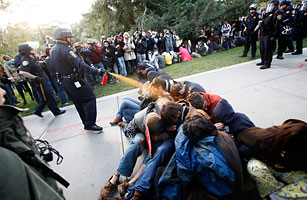
On Sept. 17, a couple hundred protesters demonstrating against the excesses of corporate execs and the pervasive influence of high finance in U.S. politics set up camp in Lower Manhattan's Zuccotti Park and refused to leave. It was an unlikely occupation, one without leaders, agendas or even a clear sense of goals, but it soon was echoed in myriad cities across the U.S. and the world. To some, Occupy Wall Street is the left-wing iteration of the Tea Party, directing their rage not at big government but at the big banks that gutted the world economy and took billions in bailouts from the U.S. government while awarding themselves hefty bonuses.
But many in the movement see their cause as part of a more global zeitgeist, in keeping with the anti-austerity demonstrations in Europe and the leaderless uprisings of the Arab Spring. The Occupy movement has remained leaderless, amorphous and spontaneous — demonstrators carry signs advocating everything from financial reform to healthcare reform to a ban on fracking — it's still unclear what sort of real lasting political effect the movement can have. But the sheer persistence of the occupations, galvanized by incidents of heavy-handed policing in New York and California that shocked the nation, have given the protesters' appeals for economic justice a weight that may play a real role in the upcoming presidential election.